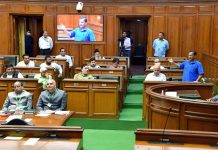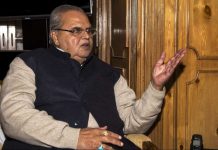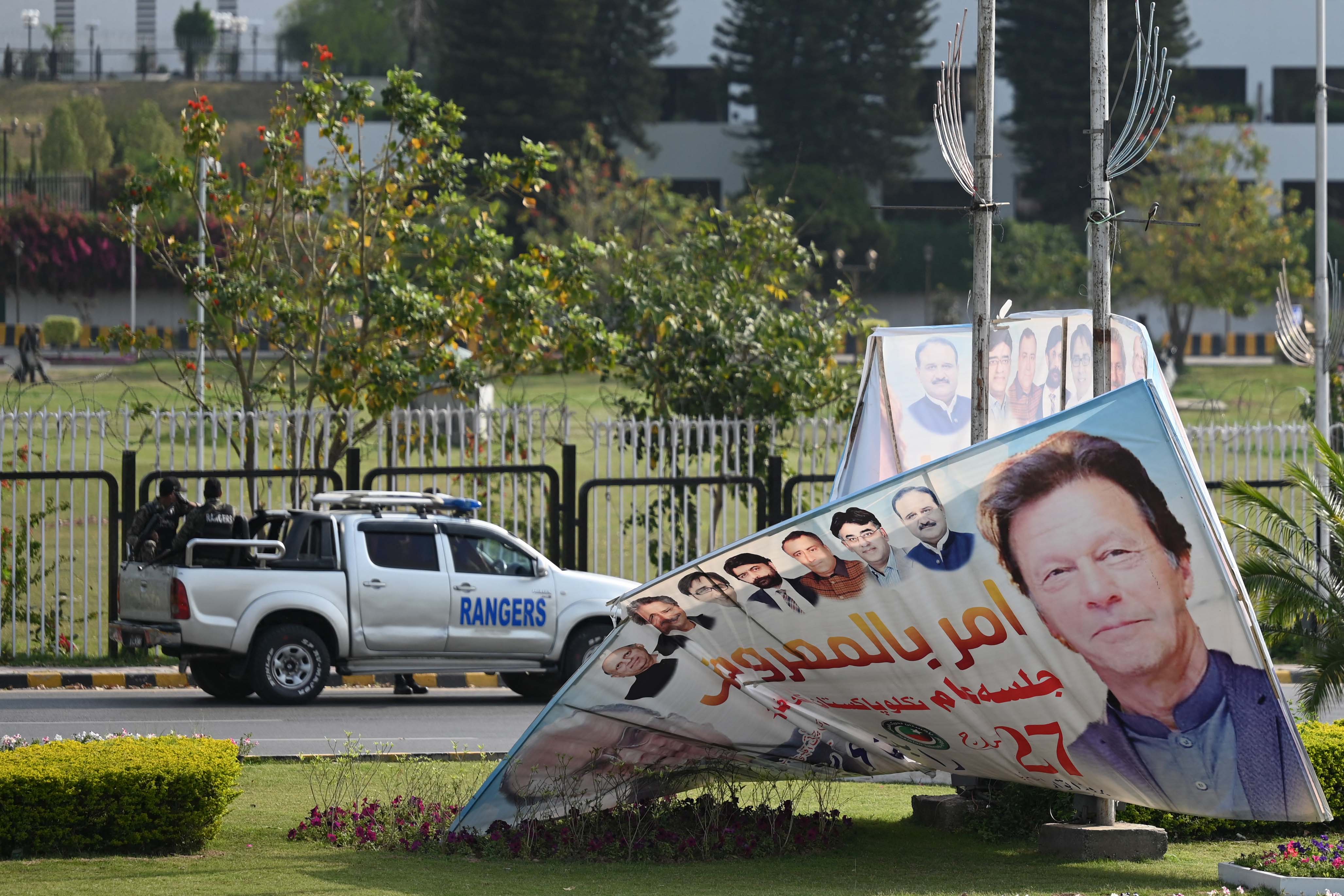
Intrigue and drama in plenty before Shehbaz Sharif gets elected as new Pakistan Prime Minister, writes Gopal Misra
The continuous horrendous behaviour of Prime Minister, Imran Khan, perhaps, brought him to his knees, slapped and disgraced, by none other, but the army chief, General Qamar Javed Bajwa, who had ensured his elevation to the coveted office in 2018.
The crucial voting finally took place in the National Assembly, which was restored by a judicial order of the Supreme Court. It took place just before the midnight following the sudden resignations of the Speaker, Asad Qaiser, and the Deputy Speaker, Qasim Suri. They had rushed to the National Assembly from the residence of Khan, where he was being ‘disciplined’ by the officers in uniform. After announcing his resignation in the House, Qaiser asked Ayaz Sadiq, a former speaker and member of the main opposition, PML-N to chair the proceedings. Under the supervision of Sadiq, the House voted in favour of the resolution with 174 law makers approving the motion.
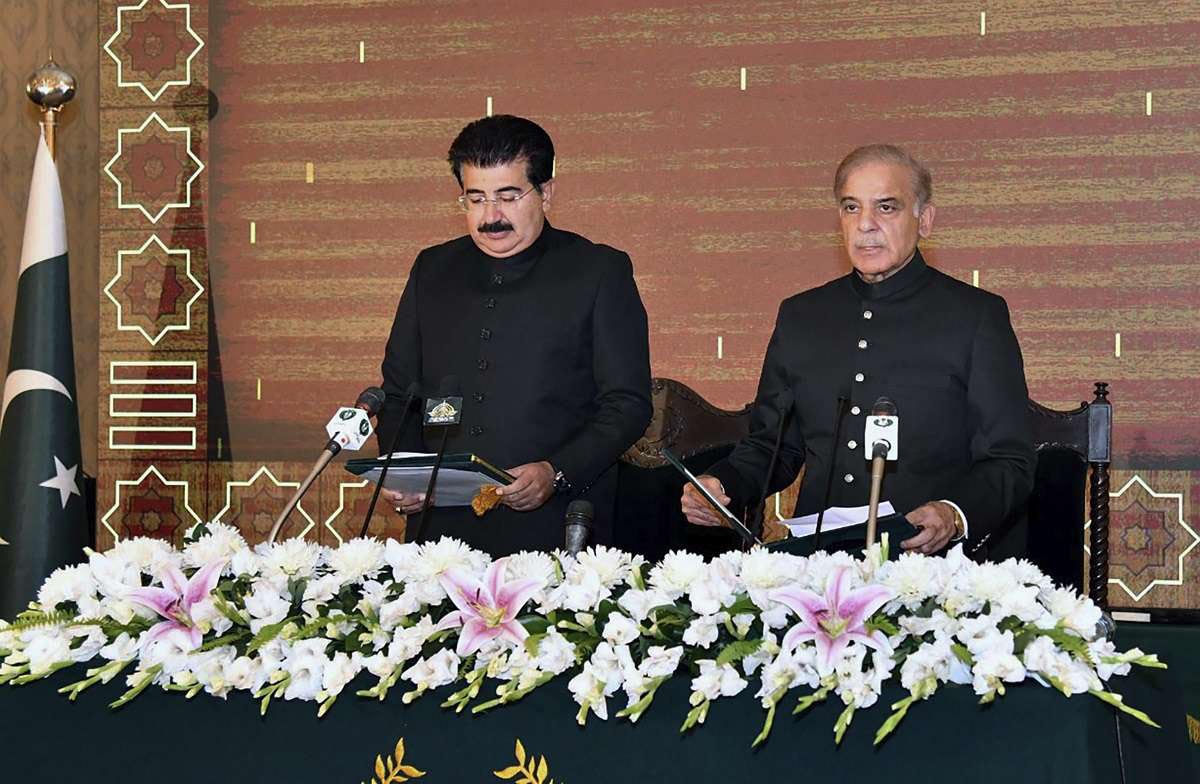
The threat to Pakistan’s nascent democracy has not ended with election of a new Prime Minister, Shehbaz Sharif, younger brother of three-time Pakistan PM Nawaz Sharif, and the finally end of the Khan regime, though for the first time in its history the army and judiciary have whole heartedly supported the democracy. It is now becoming clearer with each passing day that Khan, who was being considered a ‘babe’ in the wilderness of the Pakistani politics, perhaps, had prepared himself almost a year before for such an eventuality, if the armed forces decide to support his political rivals. Within months of assuming office, he had started cultivating jihadists, and he was convinced that since most of the soldiers hail from Punjab, the bulk of army would rally around him. If he was allowed, he might have succeeded in setting up a new Pakistan under the spell of Jihadists, finally dumping its constitution.
If the news is true, though rebutted by the public relations wing of the army, apart from Bajwa, the chief of the intelligence service, Lt. General Anjum too helped his boss to shatter Khan’s bravado, entailing the speaker and the deputy speaker rushing back to the National Assembly, announcing their resignations and thus paving way for the final vote. In next 20 minutes, Khan lost the majority and finally buried in the political history of the country. It was for the first time that a civilian PM was removed in a democratic way; and the country’s highest court, had reopened in the late hours so that the House votes on the no-confidence resolution.
The midnight drama of April 9-10, also brought home the fact that the entire administration and politics revolves around the GHQ; interestingly the democracy in Pakistan continues to be on a slippery slope. Earlier, as news appears in the local as well as in the international media that Khan had summoned the speaker and the deputy speaker to tell them that at any cost the no-confidence motion in the House should not be taken up for voting. Before they could be finally instructed, suddenly a military helicopter lands at the residence of the Prime Minister, Khan tells the presiding officer to wait in the adjacent room. He was expecting his ardent supporter, Faize Hamid, a former ISI chief and presently the core commander at Peshawar, but to his utter surprise instead he found Bajwa and Anjum.
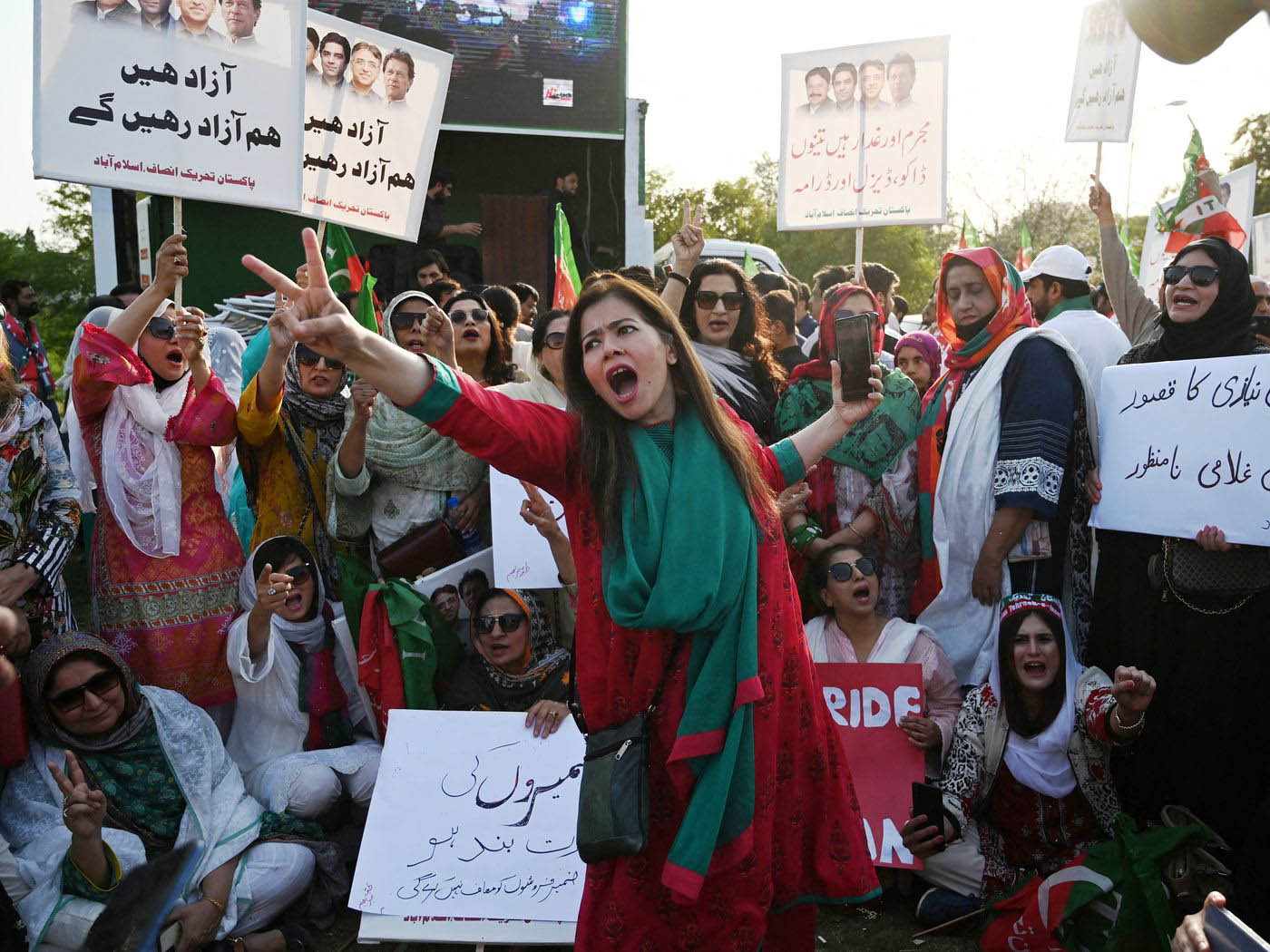
Khan, who had reportedly sacked the chief only an hour before, was not facing the top man in the uniform. They were closeted in a room, who frankly advised Khan to follow the democratic norms. He was confronted that how could he issue Bajwa’s termination order, when he himself has lost majority in Parliament and reluctant to face the House. Bajwa reportedly asked him to quit gracefully and leave the issue of his continuation to his successor being chosen in the House. It is stated, the high-pitch heated exchanges between Khan and the two top officers of army could be heard even outside the room. They had full details that while the dismissal order was sent to the concerned ministry for notification, he had summoned Faize Hamid from Peshawar to become the new chief.
The master plan of Khan fell apart because a strong message was sent from GHQ to Faize Hamid that he should remain at the place of posting, that is Peshawar, and keep off from the ongoing politics. With the exit of Khan, Faize Hamid’s ambition to become the army chief has also fell apart. He could have been elevated only by superseding at least three of his seniors; it was not acceptable to the other three core commanders. Within army, Bajwa had full support with these core commanders in this high political drama and the ‘dirty’ role of Faize Hamid.
The narrative about the mid-night events are being vehemently denied, but it is not being stated, why did Bajwa rush to the Prime Minister’s residence, and why there were heated exchanges, perhaps, accompanied by scuffle. It, however, cannot be ruled out that Khan and his supporters might soon be indulging in a blame-game implicating General Bajwa, and the Supreme Court judges accusing them of being agents of America, Israel and India.
Amidst these high-voltage developments, pro-Khan slogans were raised in the streets of Islamabad that his removal was a part of an international game-plan hatched in Washington. Among the slogan raisers were also a few retired military officers including some former brigadiers too. These demonstrations were reportedly being managed by Faize Hamid from Peshawar. These developments might soon have snow-balling effect in the armed forces, when a large number pro-Faize Hamid officers are expected to be purged in coming weeks.
Apart from the conspiracy of sacking the army chief, Khan had also sent an emissary to the supremo of the People’s Party, Asif Ali Zardari, seeking his intervention in allowing Khan and his third-wife, Bushara, to migrate out. Zardari reportedly declined to help the beleaguered prime minister that his request had come too late to him. He was unable to help Khan and others. There were also reports that the security agencies are keeping a strong vigil on the movements of Khan and his close friends.
Army Plays a Neutral Role
Earlier, the army had accepted the combined opposition’s demand of adopting a neutral role in the country’s politics, but asked that it should not be blamed for the ‘misrule’ of Khan. The issue had snowballed into a crisis, when the former Prime Minister had named Bajwa for installing Khan by manipulating the polls in favour of Khan during the 2018 elections. On his part, Bajwa had even suggested Khan not to call the leader of Pakistan Democratic Movement (PDM) Maulana Fazilur-Rahman as the ‘diesel man’, who reportedly had stolen diesel from the government supplies. The private conversation was revealed in one of his speeches recently.
In his bid to belittle the new government and General Bajwa, Khan and his supporters may embark upon in projecting the new government as an agent of America and Bajwa as a traitor. In various social media platforms, Bajwa is being compared with Mir Jafar, who had conspired against the ruler of Bengal, Nawab Sirajuddin, thus empowering the British to enslave India. Similarly, Bajwa is being accused of conniving against Khan with the enemies of Islam and Pakistan, America and Jews, and now keen to have truce with India, the land of infidels.
His supporters are confident that if radical Islam could partition India, Khan could also become a saviour of Pakistan and Islam, a leader, who already had announced Osama-bin Laden, a martyr of Pakistan, who had been fighting for Islam against the infidels, the Christians. Faize Hamid, the core commander of Peshawar is already known for hobnobbing with the Taliban regime in Kabul and is having close ties with the Tahereek-i-Taliban Pakistan (TTP), an ally of the radical Islamists in the region with modern weapons.
The High-Pitched Drama
The unprecedented high-pitch political drama was enacted with the higher judiciary and the apex of the defence establishment playing the key role. It had begun with the decision of the Chief Justice of Pakistan, Umar Ata Bandial, taking suo-moto cognizance on April 3, and later it turned into an embarrassing situation for the Khan Government. The open hearing before the Supreme Court brought two facets before the people that the country’s apex court would not tolerate any nonsense that it could ask the Speaker to dismiss the non-confidence motion just before the crucial voting as a part of a larger international conspiracy against the state of Pakistan. In his bid to outwit the decisions of the higher judiciary, Khan had quietly planned a coup with the help of a powerful section of the armed forces, but the timely intervention of Bajwa finally foiled his ‘fool-proof plan’ reportedly hatched in connivance with Faize Hamid. The opposition parties were not unaware of these developments. Maryam Nawaz , a senior leader of the PML-N, had even demanded that for the anti-state activities and stalling the no-confidence vote, Imran Khan should be arrested without any further delay.

The Khan’s strategy was to keep the law makers engaged in the marathon debate on the no-confidence motion, which had resumed following the restoration of the House by a judicial order, and quietly superannuate the present Army chief Bajwa, and to replace him by Faize Hamid promptly. If it takes place, the judiciary could be tackled in his favour with the help of Faize Hamid, who had cleverly ensured conviction of Nawaz Sharif in the courts. Interestingly, a few hours before being finally dumped in the National Assembly, a petition before the Islamabad High Court (IHC) was moved asking the court’s directive that the removal of Bajwa should not be allowed, because the Prime Minister has already lost his majority and deliberately delaying the passage of the motion against his government in the House. The IHC Chief Justice Athar Minallah summoned the court around the midnight. Simultaneously, an alert Supreme Court too had opened the court rooms and summoned the secretary of the National Assembly asking him why the deadline fixed by the court for taking up no-confidence motion is not being adhered to the schedule.
Within a few minutes of the passage of the no-confidence motion in the National Assembly, the judges of the two returned to their respective residence. The courts were not forced to intervene in the matter anymore.
Apex court verdict: A breadth of fresh air
It was indeed a day of victory for the democracy-loving people in Pakistan, the Indian sub-continent region and across the continents, when with a unanimous verdict; the five-member bench of the Supreme Court of Pakistan restored the National Assembly, thus finally sealing the political fate of Prime Minister, Imran Khan, a cricketer-turned-politician. Khan was given just 36 hours under a fixed time schedule for electing the new prime minister on the floor of the House.
With the final verdict delivered on the night of Thursday, April 7, the CJP, Umar Ata Bandial, who headed the bench, not only ended the current political and constitutional impasse of Pakistan, but also saved the army, amidst the reports that an general (Faize Hamid) was supporting Khan and was prompting him to sack the army chief General Qamar Javed Bajwa.

It is quite known that Pakistan, a country carved out from a united India 75 years ago in 1947, had been suffering the military dictatorships, and also their faith, Islam, was being hijacked for political reasons, thus eclipsing its spiritualism, for serving its rulers.
Earlier, there were apprehensions that the apex court might give a pro-Imran ruling, because Bandial, had referred the case to the same bench of the five judges, which was constituted for the Presidential reference. Apart from the CJP, it also includes Justice Ijazul Ahsan, Justice Mohammad Ali Mazhar, Justice Munib Akhtar and Justice Jamal Khan Mandokhail. It may be noted that Ijazul Ahsan was a part of the five-member bench, which had disqualified Nawaz Sharif. However, the judges lived up to the highest traditions of neutrality and fair play in this case, and thus delivered a historic verdict in favour of democracy and its institutions.
The apex court order has also ended the ‘doctrine of necessity’, which was first stated in a judgement of the then CJP, Muhammed Munir in 1951. He had validated the extra-constitutional use of emergency powers by Governor General, Ghulam Mohammed, and had ruled in favour of the dismissal of a provincial government. He had also quoted from the Roman laws that “the well-being of the people is the supreme law.” Munir’s ruling was being frequently invoked as legal justification for all subsequent martial laws in Pakistan.
Meanwhile, Ahsan Bhoon, President, Supreme Court Bar Association (SCBA), has demanded that the action of the prime minister and deputy speaker, Qasim Suri, was against the constitution and “they should be prosecuted for treason under Article 6 of the Constitution. Earlier, just a week before, the CJP had constituted a five-member bench comprising a judge from each province, to hear the presidential reference filed by the federal government seeking an opinion on Article 63(A), whether the members of the ruling party in the National Assembly could be disqualified for voting against the government. The bench was also expected to dispose of the petition filed by the SCBA, which had expressed concern on the act of the speaker of the National Assembly, who deliberately had delayed the discussion and voting on the no-confidence motion filed by the Opposition. The SCBA’s petition had expressed “strong reservations and concerns” that the Speaker had summoned the session for the no-confidence motion on March 25, which was beyond the stipulated 14 days period.
The Constitutional Crisis
The country was thrown into an unprecedented constitutional-political crisis on Sunday, April 3, when the much awaited voting on the pending no confidence resolution in the National Assembly was suddenly rejected. Instead of the Speaker, the Deputy Speaker arrived to deliver the ruling that “the no-confidence motion tabled by the opposition parties is a part of a foreign conspiracy, therefore it is being rejected”. Immediately after this ruling, Khan swiftly advised the President, Arif Alvi, for the dissolution of the House and advised for fresh elections. Accordingly, within hours, the presidential notifications regarding the dissolution of the National Assembly and fresh polls were issued. Amidst these developments, Khan also addressed the nation on the television explaining that the no-confidence motion against his government was a part of an international conspiracy.
Khan and his cronies in the government had ‘doctored’ a common regular communication from the Pakistani ambassador to create a narrative of a foreign conspiracy. He, however, did not the share the original text, but just mentioned before the Parliamentary Committee on National Security summoned to discuss it. It was stated that “there was nexus between no confidence motion against Prime Minister and the foreign intervention”; and it required a “thorough investigation by the appropriate forum” because otherwise the danger was that Pakistan’s sovereignty would be irretrievably compromised. It was based on a routine cable received in March this year that the Pakistan’s ambassador to the USA have had a discussion with Donald Lu, the US assistant under-secretary of state for South and Central Asia that “if Imran Khan continued as PM, there would be horrific consequences for Pakistan”.
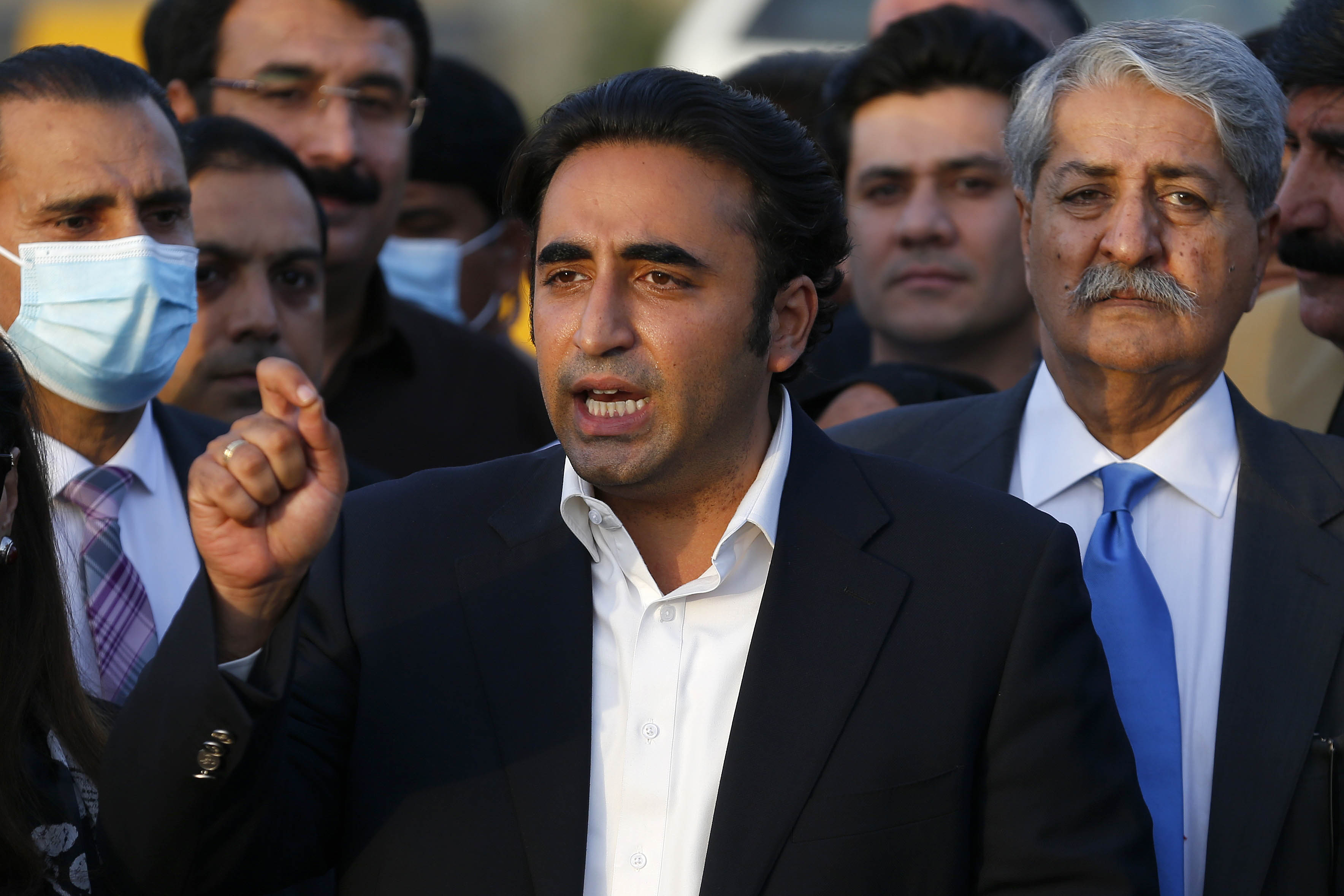
It was noted that Donald Lu, who holds a much junior position in the American administration, which, perhaps, is equivalent to a joint secretary in India, does not hold any position to influence the policy of his country. It is also stated that such observations among diplomats are common and do not indicate any deep-rooted conspiracy. It was just made a tool to get no-confidence motion rejected before the scheduled voting.
The Implications of the Ruling
The four-day discussions and debates during the crucial period, April 3-7, the deputy speaker’s ruling attracted attention of the jurists not only in Pakistan, but across India, because the dissolution of the state assemblies, has often been challenged before the higher judiciary in India too. It is being stated that the ruling was far more troubling as a matter of law.
A member of parliament who acts on the behest of a foreign power would be guilty of treason or, more precisely, of acting “in a manner prejudicial to the sovereignty, integrity or security of Pakistan.” Under Article 63A, a person who acts in such manner is liable to be disqualified but, and here’s the kicker, if and only if “he has been convicted by a court of competent jurisdiction.” However, no judgment of a competent court stating that every member of the opposition was guilty of treason has so far been delivered.
Another implication of the ruling could have been that if a political party which operates in a manner prejudicial to the integrity of Pakistan could be declared illegal by the federal government. However, under Article 17 of the constitution, the federal government must submit a reference to this effect directly to the Supreme Court. No such reference has been filed so far; thus the ruling becomes ‘bad in law’. The legal experts have also pointed out that with this ruling, the entire opposition could be disenfranchised on the basis of one man’s suspicions of treason. The argument that Article 69 prevents the Supreme Court from overruling the deputy speaker is equally feeble. Article 69 is expressly limited to “irregularities of procedure.” Disenfranchising the entire opposition on the basis of unverified allegations is not an “irregularity of procedure.” It is a travesty, if not a parody or absurd in this ridiculous situation; therefore, it is quite natural that courts have to take a cognizance to intervene, but on substantive grounds.
The Russian Support
During his tenure as PM, Khan’s relationship with the U.S. and Europe had nosedived. He’s pivoted closer to China and Russia and recently visited Moscow, reportedly against the advice of Bajwa. He had a meeting with President Vladimir Putin hours before the invasion of Ukraine. Russia has reciprocated his gesture by stating that events in Pakistan were a sign that Washington was making “disobedient” Khan to pay the price for going to Moscow. A foreign office statement further said that “We hope that the Pakistani voters will be informed about these circumstances when they come to the elections.”
The Conviction of a Military Dictator
In spite of Pakistan’s prolonged history of martial laws, the judiciary has been giving severe punishments to those who violated the basic law of the country. . The constitution provision that if anyone ever violates the constitution, he could be prosecuted under the laws invoked in the cases of the high treason. It was invoked against the military dictator, General Pervez Musharraf, for subverting the Constitution of Pakistan. He was tried for high treason stemming from his actions on November 3, 2007, when he subverted and suspended the country’s basic law, sacked 15 judges of the Supreme Court and 56 judges of the provincial High Courts. He also put the then Chief Justice of Pakistan under house arrest. Twelve years later, on December 17, 2019, a special court comprising the Chief Justice of Peshawar High Court, Waquar Ahmad Seth and judges of Sindh and Lahore high courts, Nazar Akbar and Shahid Karim convicted Musharraf guilty of high treason and sentenced him to death; however later on 13 January 2020, the Lahore High Court annulled the death sentence. The case was not followed up the Khan government because Musharraf has always been a keen supporter of Khan.








